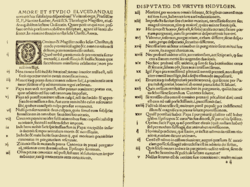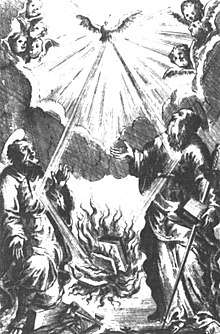Proto-Protestantism
Proto-Protestantism, also called pre-Protestantism or pre-Reformation movements,[1] refers to individuals and movements that propagated ideas similar to Protestantism before 1517, which historians usually regard as the starting year for the Reformation era. Major representatives of proto-Protestantism include Peter Waldo (c. 1140 – c. 1205), John Wycliffe (1320s–1384), Jan Hus (c. 1369 – 1415) and the movements they started.
| Part of a series on the |
| Reformation |
|---|
 |
|
Contributing factors |
|
Theologies of seminal figures |
|
|
By location |
|
Major political leaders |
|
Counter-Reformation |
|
Art and literature Painting and sculpture
Building Literature Theater |
|
Music Forms
Liturgies
Hymnals
Secular Music |
|
Conclusion and commemorations Conclusion
Monuments Calendrical commemoration |
| Protestantism |
Peter Waldo and the Waldensians
In the early 1170s, Peter Waldo founded the Waldensians. He preached for strict adherence to the Bible, for simplicity and poverty, against Catholic dogmas, like the purgatory and transubstantiation which led to conflicts with the Roman Catholic Church. He initiated, and contributed to, a translation of the New Testament into the vernacular, the Arpitan (Franco-Provençal) language.
The Waldensians had adopted ideas that in the late 1130s, Arnold of Brescia, an Italian canon regular, had developed in a first attempt to reform the Roman Catholic Church. His teachings on apostolic poverty gained currency among Arnoldists. By 1215, the Waldensians were declared heretical and subject to persecution.
John Wycliffe and the Lollards
John Wycliffe (1320s–1384) was an English theologian and professor at the University of Oxford who developed many ideas similar to those later promoted in the Reformation. He rejected papal authority over secular power, translated the Bible into vernacular English, and preached anticlerical and biblically-centred reforms. Wycliffe's teachings were spread by his followers, known as Lollards.
Jan Hus and the Hussites
Beginning in the first decade of the 15th century, Jan Hus, a Czech Catholic priest and professor who was influenced by John Wycliffe's writings, founded the Hussite movement. He was burned at the stake as a heretic in 1415. After his execution, a revolt erupted. Hussites defeated five continuous crusades proclaimed against them by the Pope.
Later on, theological disputes caused a split within the Hussite movement. Utraquists maintained that both the bread and the wine should be administered to the people during the Eucharist. Another major faction were the Taborites, who opposed the Utraquists in the Battle of Lipany during the Hussite Wars. There were two separate parties among the Hussites: moderate and radical movements. Other smaller regional Hussite branches in Bohemia included Adamites, Orebites, Orphans and Praguers.
Less influential early reformers
Throughout the Middle Ages, there were many Christian sects, cults and movements whose teachings foreshadowed later Protestant movements.[2] Some of the main groups were:
- Paulicians – an Armenian group (6th to 9th centuries) who sought a return to the purity of the church at the time of Paul the Apostle.
- Tondrakians – an Armenian group (9th to 11th centuries) who advocated the abolition of the Church along with all its traditional rites.
- Bogomils – a group arising in the 10th century in Bulgaria,[3] Macedonia and the Balkans who sought a return to the spirituality of the early Christians and opposed established forms of government and church.
- Arnoldists – a 12th-century group from Lombardy who criticized the wealth of the Catholic Church and preached against baptism and the Eucharist.
- Petrobrusians were 12th-century followers of Peter of Bruys in southeastern France who rejected the authority of the Church Fathers and of the Catholic Church, opposing clerical celibacy, infant baptism, prayers for the dead and organ music.
- Henricans were 12th-century followers of Henry of Lausanne in France. They rejected the doctrinal and disciplinary authority of the Church, did not recognize any form of worship or liturgy and denied the sacraments.
- Brethren of the Free Spirit – a term applied in the 13th century to those, primarily in the Low Countries, Germany, France, Bohemia and northern Italy, who believed that the sacraments were unnecessary for salvation, that the soul could be perfected through imitating the life of Christ, and that the perfected soul was free of sin and beyond all ecclesiastical, moral and secular law.
- Apostolic Brethren (later known as Dulcinians) – a 13th- to 14th-century sect from northern Italy founded by Gerard Segarelli and continued by Fra Dolcino of Novara. The Apostolic Brethren rejected the worldliness of the church and sought a life of perfect sanctity, in complete poverty, with no fixed domicile, no care for the morrow, and no vows.
- Neo-Adamites – a term applied in the 13th to 15th centuries to those, including Taborites, Picards and some Beghards, who wished to return to the purity of the life of Adam by living communally, practicing social and religious nudity, embracing free love and rejecting marriage, and rejecting individual ownership of property.
See also
References
- Introduction to Protestantism
- Broadbent, E.H. (1931). The Pilgrim Church. Basingstoke: Pickering & Inglis. ISBN 0720806771.
- Brockett, L. P. (1879). "The Bogomils of Bulgaria and Bosnia: or, The Early Protestants of the East - an Attempt to Restore Some Lost Leaves of Protestant History".
Further reading
- Barnett, S. J. (1999). "Where Was Your Church before Luther? Claims for the Antiquity of Protestantism Examined". Church History. Cambridge University Press. 68 (1): 14–41. doi:10.2307/3170108. ISSN 0009-6407. JSTOR 3170108.
- Stephen D. Bows: Reform before the Reformation : Vincenzo Querini and the religious Renaissance in Italy, Leiden [et al.], 2002.
- Walter Rügert: John Wyclif, Jan Hus, Martin Luther: Wegbereiter der Reformation Konstanz, 2017.
- E. H. Broadbent: The Pilgrim Church, Pickering & Inglis, 1937.
